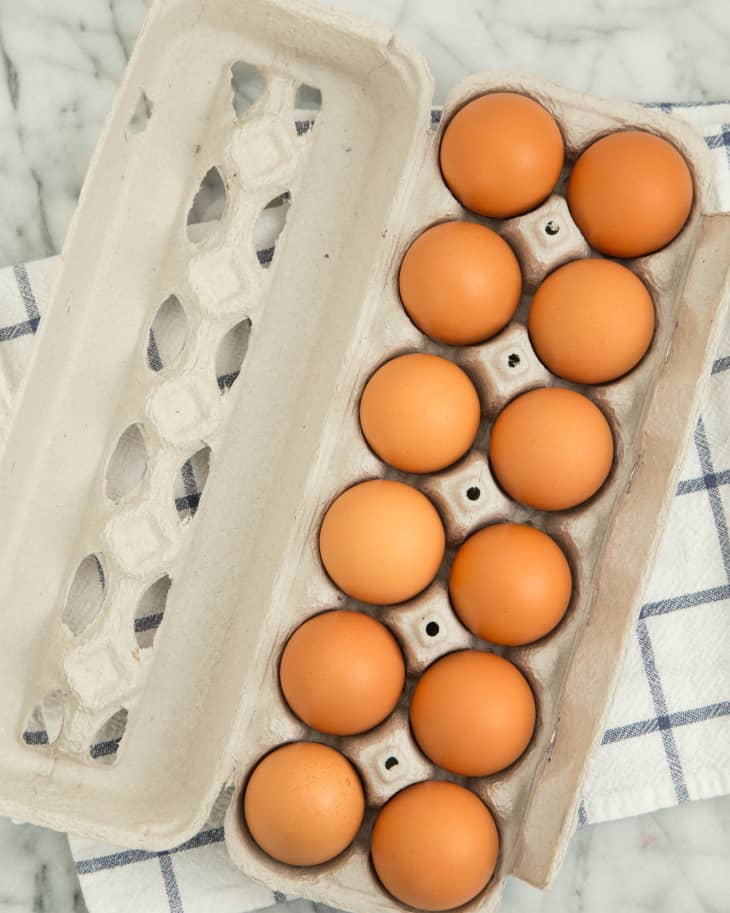Here’s How Long Eggs Last, Plus How to Store Them Properly
Eggs are a fridge staple for my family, and we make a point to keep a carton on hand at all times. From hard-boiled eggs as a quick breakfast or high-protein snack to a pan of creamy scrambled eggs for a super-simple dinner, to a quick batch of classic chocolate chip cookies, we turn to them a lot. And as an added bonus, eggs last a long time — though not indefinitely. So, how long do eggs really last?
Here’s everything you need to know about the best way to store eggs and how to tell if eggs are still good.
How Long Do Eggs Last?
Let’s start by stating the obvious: eggs do not last forever. They do, however, have a pretty long shelf life when stored properly (more on that below!).
Whole eggs in the shell
According to the USDA, whole raw eggs in the shell will last three to five weeks in the refrigerator. They’ll keep for four to five weeks beyond the pack date, and about three weeks beyond when you brought them home.
There is an exception to the refrigerator rule for farm-fresh eggs in the shell. As long as they haven’t been refrigerated at any point, farm fresh eggs can remain at room temperature for up to two weeks. (More on why this is the case below.)
Eggs out of the shell
If you happened to have some lightly–beaten eggs that you haven’t gotten around to using, they’ll keep for up to two days stored in an airtight container in the refrigerator. Any time a recipe calls for separating the eggs, like say an angel food cake that calls for just egg whites, or ice cream that requires egg yolks, we’re big proponents of saving what you don’t use. And in that case, know that stored in an airtight container in the refrigerator, raw egg whites will keep for up to four days, while raw egg yolks will keep for up to two days. Not planning to use them up in time? You can freeze egg whites and egg yolks. Both egg whites and yolks can be frozen successfully for up to a year.
How to Check If Eggs Are Still Good
Rather than taking a look at the sell-by or expiration date, a better way to check if eggs are still good is to check the pack date on the carton. The pack date is printed using a universal system called the Julian Calendar. This is printed as a three-digit number that corresponds to the day of the year the eggs were washed and packaged. For example, eggs packed on January 1 would be printed with the number 001, while 365 represents December 31.
Don’t be afraid to use sensory cues. If the egg is clean, without any cracks, and doesn’t smell off when cracked open, it’s probably fine to use. Expect an off-smelling odor from eggs that are too much past their prime.
Do Eggs Need to Be Refrigerated?
The short answer is yes (but there is one exception that I’ll get to in a minute). In the U.S. eggs sold to consumers are required to be refrigerated. As a way to prevent Salmonella contamination, eggs are washed and sanitized as soon as they’re laid. While the process removes potential bacteria, it also removes the egg’s naturally protective coating, which would otherwise allow it to be safely kept at room temperature. As a result, eggs should be stored in the refrigerator at a temperature of 40° F or lower.
The exception, as I mentioned, is farm-fresh eggs (eggs purchased directly from the farm, which have never been refrigerated, rather than from the grocery store). Because these eggs are not washed and sanitized, the eggs’ naturally protective coating is kept intact. This coating helps prevent the transmission of bacteria from the shell to the inside of the egg.
The Best Way to Store Eggs
Store-bought eggs should be stored in their original carton in the refrigerator, on a shelf towards the back. In the U.S. eggs sold to consumers are required to be refrigerated. As a way to prevent Salmonella contamination, eggs are washed and sanitized as soon as they’re laid. While the process removes potential bacteria, it also removes the egg’s naturally protective coating, which would otherwise allow it to be safely kept at room temperature. As a result, eggs should be stored in the refrigerator at a temperature of 40° F or lower. The back of the fridge is where the temperature stays more consistent. Avoid storing them on the door, where the temperature fluctuates more often because of regular opening and closing.
Not only does storing eggs in the carton protect them from potentially breaking, it also prevents the eggs from picking up unwanted odors or flavors from any pungent foods in the fridge.
What About Cooked Eggs?
As for cooked eggs, hard-boiled eggs will last for one week in the fridge, while other types of leftover cooked eggs dishes should be eaten within three or four days, according to the FDA.
